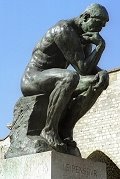May 21, 1868
Why, I ask myself, does love always make one think of death? Because it is itself a death, death to ourselves, the annihilation of the sombre despot of whom the Persian poet speaks, the extinction of egoism, of the personal, solitary life. And this death is a new life; but this life is indeed a death.--Why is it that woman, nervous, feeble, timid as she is, feels that danger has ceased to exist when she is with the one she loves? Because to die on the heart of her beloved is her secret dream. Paradise for her is to be together; whether in suffering, joy, pleasure or death is a secondary matter. To cease to be two, to make a single one, at all costs, everywhere, always: that is her aspiration, her soul, her cry, her instinct. Woman has only one religion, love; love has only one concern, ecstatic identification, the combustion of isolated beings and their union in a single flame. And there are people who deny and scoff at mysticism, when half of our species has no other cult, no other faith, no other ideal, when the supreme state glimpsed by the tender feelings, by lofty piety and great poetry bears witness to this moral reality! Mysticism, which disturbs the reason, is the natural home- land of the soul. Its more summary method ends in the same result as speculation; it brings one back to Unity and the Absolute. It breaks down the temporary and fictitious barriers of individuality. It gives vent in the finite breast to the overflowing sentiment of the infinite. It is an emancipation, a metamorphosis, a transfiguration of our poor little Self.
Previous Index Next
Search This Blog
The Jiggly Room
Polk High
The Encyclopedia Marxofeminist

Feminist "Equality" Includes The Loss of Free Speech
Sheeple Fighting Back!
- Black Sheep - You Tube (2min)
- Symantec (SYMC - NASDAQ) Downgraded to "Sell"
- Problems With Norton Internet Security?
- Cypress CEO Responds to Nun's Urging a "Politically Correct" Board Make-Up
- Do You Believe Women Have the Right to Free Speech?
- Canadian Feminists Getting Worried?
- Seven Ways To Get Traffic Without Google
Not All Women Are Like That! (NAWALT)
Myths, Legends & Religions

You are not god. Learn to observe without judging.

- Cypress CEO Responds to Nun's Urging a 'Politically Correct' Board Make-up
- The Baby Bomb: How the Boomers were Used to Demolish a Culture
- Statement of Bill Wood to the Committee on Ways and Means
- Why Did Feminists Attack the Family? -- by Heretical Sex
- Political Correctness - The Revenge of Marxism -- by Baron Bodissey
- Are Americans Practicing Communism? (The Ten Planks of the Communist Manifesto)
"We can't expect the American People to jump from Capitalism to Communism, but we can assist their elected leaders in giving them small doses of Socialism, until they awaken one day to find that they have Communism." -- Nikita Krushchev

THE ANIMAL FARM REALITY OF "FEMINIST EQUALITY:"
"Differences [between men and women], including the products of social inequality, MAKE UNEQUAL TREATMENT NOT UNEQUAL AT ALL." -- Catharine MacKinnon, "Reflections on Sex Equality Under Law," Yale Law Journal, 1991
Blog Archive
-
▼
2003
(151)
-
▼
January
(150)
- The Woman Question -- by Stephen Leacock (1916)
- Woman's Fickleness -- The Folk-Lore of Women -- by...
- Local Allusions to Women -- The Folk-Lore of Women...
- Red Haired Girls -- The Folk-Lore of Women -- by T...
- Woman's Secrets -- The Folk-Lore of Women -- by T....
- Love Tests -- The Folk-Lore of Women -- by T.F. Th...
- Woman's Hate -- The Folk-Lore of Women -- T.F. Thi...
- Woman's Love -- The Folk-Lore of Women -- T.F. Thi...
- Bad Women -- The Folk-Lore of Women -- T.F. Thiste...
- Woman's Goodness -- The Folk-Lore of Women -- by T...
- Woman's Tongue -- Folk-lore of Women -- by T.F. Th...
- Woman's Eyes -- The Folk-lore of Women -- T.F. Thi...
- Woman's Dress -- The Folk-lore of Women -- by T.F....
- Woman's Beauty -- The Folk-lore of Women -- by T.F...
- Woman's Characteristics -- Folk-lore of Women -- b...
- Preface, The Folk-Lore of Women -- by T.F. Thistel...
- Folklore of Women -- by T.F. Thistelton-Dyer (1906)
- I. On Female Suffrage -- by G.K. Chesterton
- XIV. Folly and Female Education -- by G.K. Chesterton
- V. An Evil Cry -- by G.K. Chesterton
- XII. The Modern Slave -- by G.K. Chesterton
- XI. The Queen and the Suffragettes
- X. The Higher Anarchy -- by G.K. Chesterton
- IX. Sincerity and the Gallows -- by G.K. Chesterton
- VIII. The Brand of the Fleur-de-lis -- by G.K. Che...
- VII. The Modern Surrender of Woman
- VI. The Pedant and the Savage - by G.K. Chesterton
- V. The Coldness of Chloe -- by G.K. Chesterton
- IV. The Romance of Thrift -- by G.K. Chesterton
- III. The Emancipation of Domesticity -- by G.K. Ch...
- II. The Universal Stick -- by G.K. Chesterton
- I. The Unmilitary Suffragette -- by G.K. Chesterton
- III The Common Vision -- by G.K. Chesterton
- II Wisdom And The Weather -- by G.K. Chesterton
- Part One: The Homelessness of Man -- by G.K. Chest...
- What's Wrong With The World -- by G.K. Chesterton ...
- (From) Principles of Psychology -- by William James
- (From) New Introductory Lectures on Psycho-Analysi...
- Need It Be So? - by Leo Tolstoy (1900)
- Virginibus Puerisque - Chapter One - By Robert Lou...
- The Intimate Journal of Henri Amiel: August 8, 1876
- The Intimate Journal of Henri Amiel: May 21, 1868
- A Collection of Writings on Women -- Freiderich Ne...
- The Intimate Journal of Henri Amiel: April 26, 1868
- The Intimate Journal of Henri Amiel: September 17,...
- The Intimate Journal of Henri Amiel: March 25, 1878
- The Intimate Journal of Henri Amiel: March 24, 1878
- The Intimate Journal of Henri Amiel: February 1, 1876
- The Intimate Journal of Henri Amiel: February 15, ...
- The Intimate Journal of Henri Amiel: April 2, 1873
- The Intimate Journal of Henri Amiel: February 16, ...
- The Intimate Journal of Henri Amiel: May 6, 1852
- The Intimate Journal of Henri Amiel: May 3, 1852
- The Intimate Journal of Henri Amiel: April 3, 1873
- The Intimate Journal of Henri Amiel: December 11, ...
- The Intimate Journal of Henri Amiel: April 1, 1870
- The Intimate Journal of Henri Amiel: May 13, 1869
- The Intimate Journal of Henri Amiel: December 26, ...
- The Intimate Journal of Henri Amiel - March 17, 1868
- The Intimate Journal of Henri Amiel (selections)
- Woman/Man -- From Kierkegaard's Journals
- On Women - by Arthur Schopenhauer, 1851
- IN VINO VERITAS (or THE BANQUET) -- by Soren Kierk...
- The Metaphysics of the Love of the Sexes - by Arth...
- Democracy in America, Vol. 2, Ch. XII, "How The Am...
- A Bachelor's Complaint of the Behaviour of Married...
- Tom Pry's Wife -- by Charles Lamb (1775-1834)
- Thomas Jefferson - The Aristocracy of Beauty
- Thomas Jefferson - Random Remarks as a Young Man
- Thomas Jefferson - A Bill for Proportioning Crimes...
- Thomas Jefferson - On Mrs. Merry [Wife of British ...
- Thomas Jefferson - On Marie Antoinette
- Thomas Jefferson - Religion and The University
- Thomas Jefferson - Commerce, War, and Revolution
- Thomas Jefferson - Amazons and Angels
- Thomas Jefferson - On European Education
- Thomas Jefferson (selections)
- Letter to His Son (excerpt) -- by Lord Chesterfiel...
- The Spirit of Laws - Book XXVII
- The Spirit of Laws - Book XIX
- The Spirit of Laws - Book XVII
- The Spirit of Laws - Book XVI
- The Spirit of Laws - Book VII
- The Spirit of Laws (excerpts) -- Baron de Montesqu...
- Man Superior to Woman - Conclusion
- Man Superior to Woman - Chapter Six
- Man Superior to Woman - Chapter Five
- Man Superior to Woman - Chapter Four
- Man Superior to Woman - Chapter Three
- Man Superior to Woman - Chapter Two
- Man Superior to Woman - Chapter One
- Man Superior to Woman - Introduction
- Man Superior to Woman - Dedication to the Ladies
- Man Superior to Woman -- by A Gentleman, 1739
- Memoirs Of Louis XIV And The Regency, Vol. III, Ch...
- "The Man-Woman" -- Hic Mulier, 1620
- The Fifteen Joys of Marriage (first two "joys") --...
- Termination of the Female Sex - Mathieu of Boulogne
- Monstrous Woman - Mathieu of Boulogne
- Mother of Calamity - Mathieu of Boulogne
-
▼
January
(150)

"Only an armed people can be the real bulwark of popular liberty." -- V.I. Lenin
Repeal the Canadian Gun Registry

"A system of licensing and registration is the perfect device to deny gun ownership to the bourgeoisie." -- V.I. Lenin
"We shall destroy you from within!" -- Nikita Krushchev, during the Kitchen Debate, 1959
"Self Made Man" - Sculpture by Bobbie Carlyle
Websites
The Demographic Trap

"Destroy the family, you destroy the country." -- V.I. Lenin
"America is like a healthy body and its resistance is threefold: its patriotism, its morality, and its spiritual life. If we can undermine these three areas, America will collapse from within." -- Josef Stalin
Back to the Bible
A Non-Bible Thumper Point of View
"The aim of socialism is not only to abolish the present division of mankind into smaller states and all-national isolation, not only to bring the nations closer to each other, but also to merge them." -- V.I. Lenin
No Thanks - We'd Rather Be Canadian!
Man-Made Global Warming is a Hoax being used to bring about Global Communism (Globalization)

"Every collectivist revolution rides in on a Trojan horse of 'emergency'. It was the tactic of Lenin, Hitler, and Mussolini. In the collectivist sweep over a dozen minor countries of Europe, it was the cry of men striving to get on horseback. And 'emergency' became the justification of the subsequent steps. This technique of creating emergency is the greatest achievement that demagoguery attains." -- Herbert Hoover
Beware the Cultural Marxism of Environmentalists
"The threat of environmental crisis will be the 'international disaster key' that will unlock the New World Order." -- Mikhail Gorbachev, quoted in "A Special Report: The Wildlands Project Unleashes Its War On Mankind", by Marilyn Brannan, Associate Editor, Monetary & Economic Review, 1996, p. 5

ABOLISH THE UNITED NATIONS
The Marxism of Multi-Culturalism

"Tolerance is how far a mechanical part can deviate from the norm before it screws up the entire machine." -- Any Mechanic
The Grinch That Steals Children's Souls

"Give us the child for 8 years and it will be Bolshevik forever." -- V.I. Lenin
"We must declare openly what is concealed, namely, the political function of the school...It is to construct communist society." -- V.I. Lenin
Extra, Extra!



"The oppressed are allowed once every few years to decide which particular representatives of the oppressing class are to represent them." -- Karl Marx
The Liberal Party of Canada = Cultural Marxist Agenda
- The Real Pierre Trudeau: Father of Canada's Permissive Society -- by Steve Jalsevac
- Pierre Elliot Trudeau - Cultural Marxist Wrapped In a Canadian Flag
- The Multi-Tasking Pink Proletariat
- The Right Dishonourable Paul Martin Wants Canadians to "Give Up A Little Of Our Sovereignty To Make The World Work." -- YouTube 2:38 (Maybe We Should Lock Him Up To Make Canada Work!)
Congratulations, Karl Marx!

Marxism Links (For Researching)

- A Brief Overview of Marxism: "Communist (Community) Oriented Policing" - by Phil Worts
- Antonio Gramsci - Collected Works, including the Prison Notebooks
- Antonio Gramsci's Life & His Marxist Theories Explained
- Communist Manifesto - by Karl Marx & Frederick Engels
- Herbert Marcuse Official Homepage
- Herbert Marcuse, Haters of
- Marxists Internet Archive
- The Conflict Tradition
- Women and Marxism
Rule by Science

Philosophy Corner

“Dialectical thought is related to vulgar thinking in the same way that a motion picture is related to a still photograph. The motion picture does not outlaw the still photograph but combines a series of them according to the laws of motion.” -- Leon Trotsky
Dialectical Thought is a Cornerstone of Marxism, and Feminism (Because They Are One In the Same)
The Marxist Dialectic's Zig-Zag

Wishing to advance in a room full of people, I do not walk through the aisle and straight toward my goal. Nor do I move slowly through the crowd shaking hands with friends and acquaintences, discussing points of interest, gradually nearing the objective. The dialectical pathway is different. It consists of a resolute forward advance followed by an abrubt turn and retreat. Having retreated a distance there is another turn and advance. Through a series of forwardbackward steps the goal is approached. To advance thus is to advance dialectically. The Communist goal is fixed and changeless, but their direction of advance reverses itself from time to time. They approach their goal by going directly away from it a considerable portion of the time. Lenin wrote the textbook, One Step Forward, Two Steps Back. Chinese Communist schoolchildren are taught to do the dialectical march taking three steps forward and two steps back. If we judge where the Communists are going by the direction in which they are moving we will obviously be deceived -- Dr. Fred Schwarz, President of Christian Anti-Communism Crusade
Critical Theory

All's Fair In Love and War


The Matriarchy Lives! (Click Picture)

"I am most anxious to enlist everyone who can speak or write to join in checking this mad, wicked folly of 'Women's Rights', with all its attendant horrors, on which her poor feeble sex is bent, forgetting every sense of womanly feelings and propriety. Feminists ought to get a good whipping. Were woman to 'unsex' themselves by claiming equality with men, they would become the most hateful, heathen and disgusting of beings, and would surely perish without male protection." -- Queen Victoria, 1870


Please Give Manginas the Respect They Deserve: NONE!

























